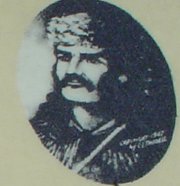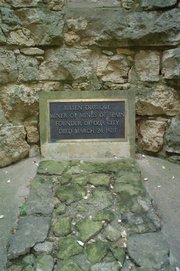Julien Dubuque
|
|
Once he had received permission from the Fox to mine lead, Julien Dubuque remained in the area for the rest of his life. He befriended the local Mesquakie Chief Peosta - whom the nearby town of Peosta, Iowa is named after. It is widely believed that Dubuque married Peosta's daughter Potosa - however there is no official proof that this was ever the case. Those who back the marriage claim point to letters that mention a Madame Dubuque as meaning Dubuque's wife.
Dubuque's Death
Julien Dubuque died on March 24, 1810. Dubuque's Native American friends gave him a chief's funeral. He was then buried on a bluff overlooking the Mississippi River about two miles south of the present city of Dubuque. A wooden structure was built over the grave site.
JDubuqueMonument061104.jpg
Over the years, the wooden structure over Dubuque's grave had deteriorated. Weather and souvenir hunters had done a great deal of damage to the site. In the late 1890s Dubuque's remains were exhumed. A local cabinet manufacturer placed Dubuque's remains in a new casket. A number of Dubuque citizens supported the building of a new monument that was made of native stone. In 1896 Dubuque's remains were reburied in this new final resting place.
When Dubuque was exhumed, several other skeltons were found in the site with him. One skeleton was believed to be that of Dubuque's friend Peosta. The remains of Chief Peosta were reburied in a new grave a short distance from Dubuque's new grave site.
Eventually, the Julien Dubuque Monument became a National Historic Landmark. A number of improvements have been made to the site over the years to increase the accessibility. Also, a number of people had fallen to their deaths from the bluff where Dubuque was buried, a fence was built along the top of the bluff to help prevent any future accidents.
Dubuque's Legacy
Julien Dubuque is remembered as the first European to settle in what would become the state of Iowa. He is remembered as a friend of the Native Americans in the area and a champion of their cause. Dubuque was also a generous man who spent lavishly on many friends - this had the unfortunate effect of keeping him in debt during the latter part of his life.
When what would eventually become Iowa was opened up to European settlement, the settlement in the area where he had mined was named after him. It was known by several names, including DuBuque's Mines. Eventually, the village became the first city in Iowa, and was named Dubuque in memory of Julien Dubuque.



